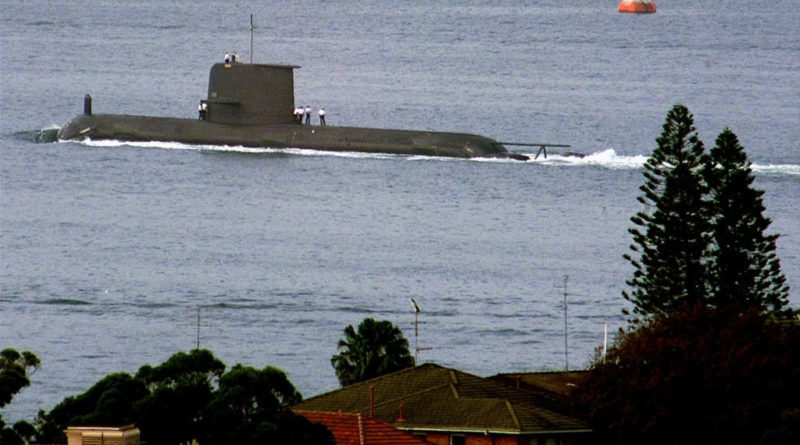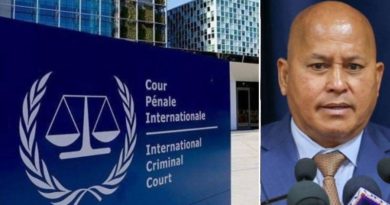OP ED | OPINION-EDITORIAL- Nuclearizing the Indo-Pacific
A Royal Australian Navy Collins-class submarine, the HMAS Waller, leaves Sydney Harbour, Australia, on May 4, 2022. The country’s nuclear-powered submarine building program, backed by the United States, could generate 20,000 jobs, Australian Prime Minister Anthony Albanese has said. (Reuters/DG/CC)
.

\Versi Bahasa Indonesia
Australia’s announcement that it is acquiring nuclear-powered submarines from the United States is escalating the heat in the already tense Indo-Pacific region, and now with the added nuclear factor thrown into the pot. It has certainly angered China, the target of Australia’s military buildup, and caused concerns for other countries, including Indonesia.
Granted it’s not a nuclear weapon, but acquiring the nuclear technology to build the submarines takes Australia a step closer to becoming a nuclear power. It is setting a precedent in exploiting the nuclear naval propulsion clause in the Non-Proliferation Treaty (NPT), which is designed to prevent more countries from acquiring nuclear weapons and keep the world safe.
Canberra’s assurances that it will abide by the NPT and pointing out at its fine records does not guarantee that other countries will not follow suit, in the name of protecting sovereignty or any other pretext. We already have more than our share of nuclear countries in the Indo-Pacific region. We could do with less, and not more. Australia’s move is dangerously paving the way toward the full nuclearization of the region.
The submarine deal announced last week comes under the auspices of the trilateral defense pact known as AUKUS involving Australia, the United Kingdom and the US. It was founded in 2021 with the intention to counter the growing military strength of China in the Indo-Pacific region.
Now, more than ever, Australia is living up to its reputation as the self-appointed deputy sheriff in this part of the world for the US, a term incidentally coined in 1992 by then prime minister John Howard.
The deal, which will cost Australian taxpayers A$368 billion (US$244 billion) for the next three decades will include the delivery of two or three Virginia-class submarines in the 2030s, and followed by the development of a new submarine class SSN-AUKUS in South Australia, with the technology provided its two AUKUS partners.
Indonesia’s response has been appropriate and measured, not outrightly opposing Australia acquiring the nuclear submarines and as well as the technology to build them. In a statement, the Foreign Ministry reminded Canberra of its obligations under the NPT and to build the safeguards mandated by the International Atomic Energy Agency, including the verification mechanism that is effective, transparent and non-discriminatory.
Indonesia last year succeeded in leading the campaign to mainstream the issue of nuclear naval propulsion in building submarines. During the periodic review of the Conference of Parties to the Treaty on the Non-Proliferation of Nuclear Weapons, Indonesia warned that the nuclear propulsion article has the potential to pose a big risk to world peace. Obviously, it had not moved fast enough to prevent Australia from using the loophole as it announced the plan last week.
There is no denial that China’s rapid military buildup, including in the hotly contested South China Sea, these past two decades has changed the power balance in the Indo-Pacific. All other countries in the region and beyond are adjusting to this new reality in different ways. The US is leading the campaign to stem the rise of China by building alliances, including establishing AUKUS now with the nuclear-submarine deal with Australia.
While we cannot stop Australia from moving ahead with the plan, Indonesia should continue to voice its long-held opposition to the nuclearization of the Indo-Pacific region and the rest of the world for that matter.
To the suggestions as echoed by officials and observers in Australia that Indonesia is a beneficiary of the greater security protection provided by the presence of Australia’s nuclear-powered submarines, this may be true if China was the single biggest threat to regional peace.
If history is any guide, there are other powers and countries that have the potential to threaten regional peace and stability.
Editorial board
The Jakarta Post
Jakarta
● Tue, March 21, 2023
.
EDITOR IN CHIEF
 Ads by: Memento Maxima Digital Marketing
Ads by: Memento Maxima Digital Marketing
@[email protected]
SPACE RESERVE FOR ADVERTISTMENT


 Memento Maxima Digital Marketing
Memento Maxima Digital Marketing







